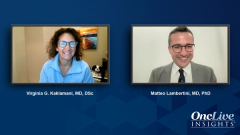
Overview of Fertility Preservation Strategies in Breast Cancer Care
Key opinion leaders on breast cancer management provide a broad overview of fertility preservation strategies available to patients.
Episodes in this series

Transcript:
Virginia G. Kaklamani, MD, DSc: Let’s move on to what to do about this. What are the strategies that we use so that we can preserve fertility for our patients? Matteo, if you have a patient who says, “Yes, I’m interested in having children; I don’t have any children; I’m 35 years old,” how do you discuss the different fertility preservation strategies with her?
Matteo Lambertini, MD, PhD:I would say this is the second part of the oncofertility counseling: how we try to address the risk of infertility on this aspect before going into the different strategies. What I think is important to clarify—and this is also what I do with my patient in front of me—is: to distinguish between infertility and those patient interests in this or concern about the [adverse] effect, I will discuss fertility preservation option. On the other side is the more general premature ovarian insufficiency or chemotherapy-induced amenorrhea, which is also infertility, but it’s also all the other [adverse] effects of early menopause. On one side we have fertility preservation strategies; on the other side we have ovarian function preservation strategies. For those patients [who] are interested in fertility preservation, they want to increase their chances of having a future pregnancy. The most important aspect for us as medical oncologists is to create a network with the fertility specialist so that we can refer [this patient] as soon as possible to our fertility specialist. Because the standard option for fertility preservation is embryo oocyte cryopreservation, this is the first option to be offered to those patients. And usually, at my center [University of Genoa – IRCCS Ospedale Policlinico San Martino], we tend to use the 40-year cutoff. We tend not to propose this strategy to women older than 40 years because the success rate of this option in patients older than 40 years is quite low—less than 10%. The older [the patient], the lower the chances…. [T]hose patients [who] do not have access to this strategy are not eligible because, for example, we don’t have 2 or 3 weeks of time, which is the time needed for oocyte embryo cryopreservation, which is not very frequent in breast cancer; we normally have 2, 3 weeks of time. It’s not a major burden, but other patients, rheumatological patients or some specific circumstances, we may have this concern. In these cases, the second option is ovarian tissue cryopreservation, which is a more surgical and a bit more complex procedure, but it’s an effective procedure for patients [who] are young and actually even younger than this 40-year cutoff. The cutoff for ovarian tissue preservation goes down to 35, 36 years because beyond that the success rate is quite low. Then after cryopreservation procedure, usually the patient comes back to my attention and then I start GnRH [gonadotropin-releasing hormone] agonists during chemotherapy to protect ovarian function during chemotherapy. But then on the other side, I also have the patient [who] replied to me they are not interested in fertility preservation, they’re not interested in a future pregnancy, but they don’t want to enter menopause at an early age. So, they are concerned more [about] the [adverse] effects of early menopause. And these apply also to women older than 40, 42, 45 years…with triple negative disease. So, there is no reason to enter menopause at an early age. In this case, I do not refer this patient to fertility specialists, but I do offer [to my patient] ovarian suppression during chemotherapy to try to reduce the risk of chemotherapy-induced premature ovarian sufficiency. I don’t know, on this aspect, Virginia, if you have a different practice or a different view on this specific algorithm.
Virginia G. Kaklamani, MD, DSc: I think the only difference for us is that we don’t use an age cutoff. If a woman is interested in oncofertility, then we will refer her to the specialist. We’ll let them discuss what the percentage of success is. We will have some women over the age of 40 [who] may end up having embryo cryopreservation. And to me, obviously the older [the] woman, the lower the chance that she will successfully be able to freeze embryos, but at least if she’s interested in trying I will give her that opportunity.
Matteo Lambertini, MD, PhD:I think this is indeed important. Usually, age is not clear-cut so sometimes also we do refer patients older than 40 years. On these aspects, I also feel that it’s important that the patient has a discussion with fertility specialists on what the fertility preservation procedure is and what’s the success according to her age. In my practice, something that could be useful [is] this type of counseling. What I do when I see this patient at my first consultation—and I discussed this topic as part of the counseling on treatment and on the use of chemotherapy—among the blood tests…I also include the anti-Müllerian hormone because this can be very helpful, particularly in this gray zone. So those women around the age of 40, because AMH [anti-Müllerian hormone] is very useful, it’s important for fertility specialists to estimate the success of oocyte embryo cryopreservation. If the fertility specialist sees the patient the day after I have my first medical consultation with the patient, the fertility [specialist already has] the AMH results available. So it’s not only a discussion about the age—so 39, 40, 41—but it’s also the age plus the AMH level. And with these two factors, the counsel of the fertility [specialist] and the success of this procedure can be much more precise and much better counseling for the patient in deciding [whether] to undergo…this procedure.
Transcript edited for clarity.






































